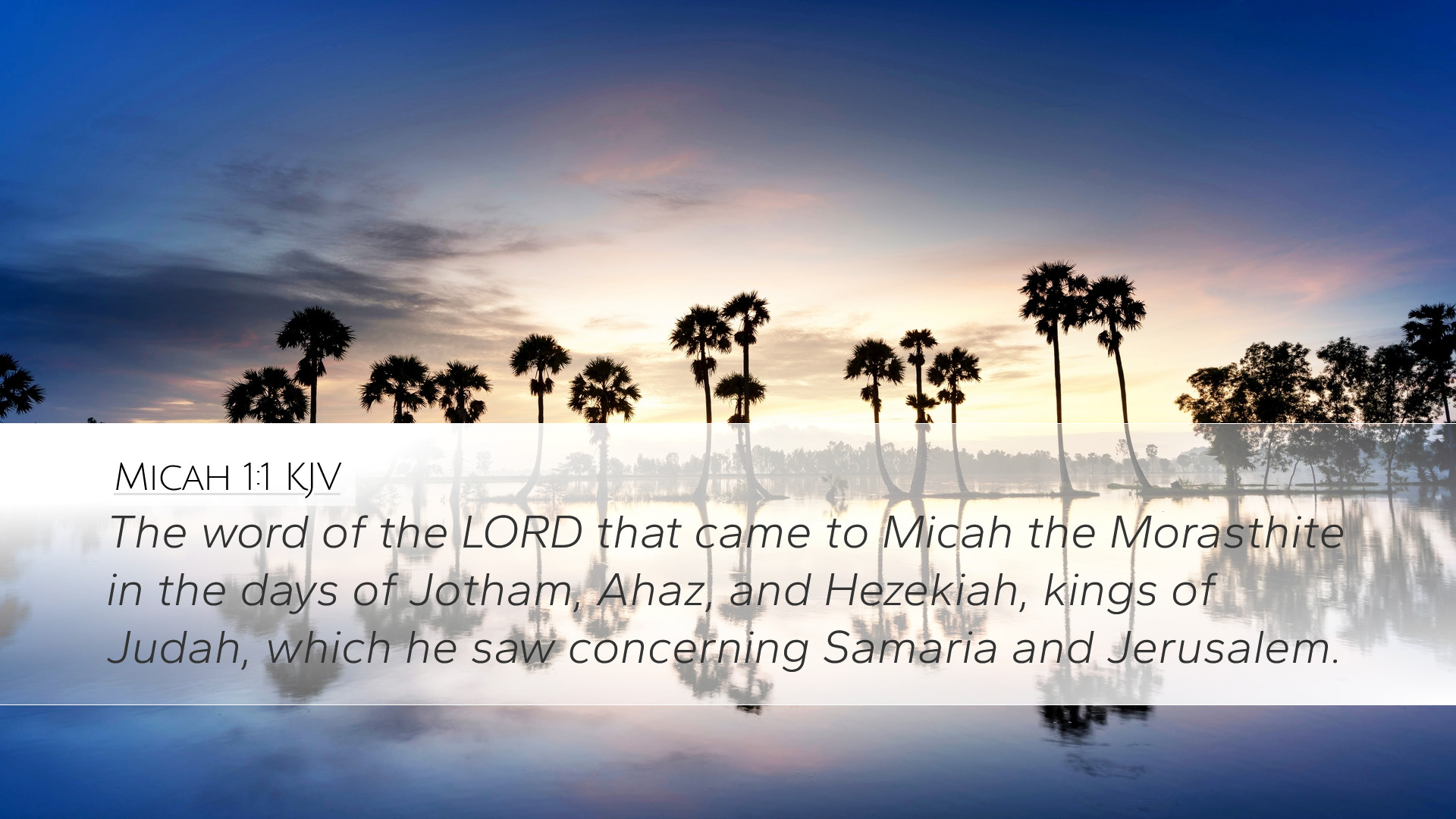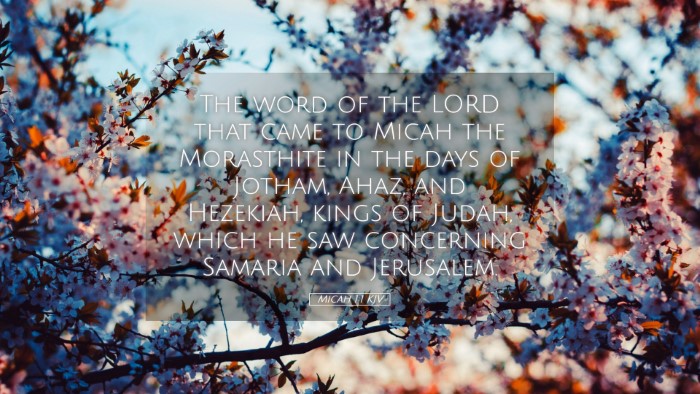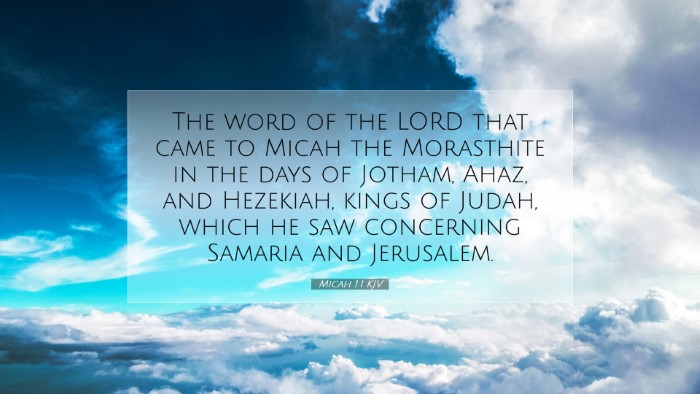Old Testament
Genesis Exodus Leviticus Numbers Deuteronomy Joshua Judges Ruth 1 Samuel 2 Samuel 1 Kings 2 Kings 1 Chronicles 2 Chronicles Ezra Nehemiah Esther Job Psalms Proverbs Ecclesiastes Song of Solomon Isaiah Jeremiah Lamentations Ezekiel Daniel Hosea Joel Amos Obadiah Jonah Micah Nahum Habakkuk Zephaniah Haggai Zechariah MalachiMicah 1:1
Micah 1:1 KJV
The word of the LORD that came to Micah the Morasthite in the days of Jotham, Ahaz, and Hezekiah, kings of Judah, which he saw concerning Samaria and Jerusalem.
Micah 1:1 Bible Commentary
Commentary on Micah 1:1
Micah 1:1 states, "The word of the LORD that came to Micah the Morashtite in the days of Jotham, Ahaz, and Hezekiah, kings of Judah, which he saw concerning Samaria and Jerusalem." This verse serves as an introductory commentary that sets the stage for the prophetic messages that follow. In this analysis, we will delve into insights gathered from respected public domain commentaries.
Context and Background
The context of Micah 1:1 is crucial for understanding the message of the entire book. Micah prophesied during a tumultuous time in the history of Israel and Judah, approximately between 740 and 686 BC. This was a period marked by political instability, moral decay, and social injustice.
-
Mosaic Prophets:
According to Matthew Henry, Micah's role as a prophet corresponds to the tradition of Mosaic prophecy, where God’s messengers are sent to call His people back to faithfulness amidst their unfaithfulness.
-
Political Context:
Albert Barnes emphasizes the significance of the kings during this period—Jotham, Ahaz, and Hezekiah—who represent contrasting approaches to governance in Judah. Jotham was relatively righteous, Ahaz was notably wicked, and Hezekiah was known for reforming Judah’s practices and returning to the observance of God's laws.
-
Historical Setting:
Adam Clarke notes that this period in Judah's history saw the rise of prophetic voices due to the people’s rejection of divine law, which resulted in social injustices, corrupt leadership, and idolatry.
Analysis of the Verse
This introductory verse indicates several critical aspects of Micah's prophetic ministry:
-
The Source of the Message:
Matthew Henry underscores that the phrase "The word of the LORD" indicates divine origin. Micah was not merely expressing his thoughts but delivering a message directly from God, which emphasizes its authority and urgency.
-
Micah’s Identity:
Micah being referenced as "the Morashtite" indicates his humble beginnings from Moresheth-Gath, a small village in Judah. Albert Barnes points out that this serves as a reminder that God often chooses the weak and the lowly to pronounce His truth.
-
Time Frame:
Micah prophesied during the reigns of three kings; this denotes the prolonged nature of his ministry and the dire circumstances faced by Judah throughout this time. Adam Clarke reflects that this era was crucial for shaping the prophetic message concerning judgment and restoration.
-
Geographical Scope:
The mention of both Samaria and Jerusalem in the verse signifies the dual focus of Micah's message. According to Matthew Henry, it illustrates how the Northern Kingdom's sins mirrored those of the Southern Kingdom, thus implying a collective accountability before God.
Thematic Insights
The themes highlighted in Micah 1:1 encompass fundamental issues such as divine judgment, social justice, and true worship. The following observations emerge from the commentaries:
-
Divine Judgment:
Micah’s role was to announce the coming judgment on both kingdoms. Albert Barnes points out that the Lord's voice through Micah serves as a warning to both Israel and Judah about the consequences of their sins.
-
Call for Repentance:
This prophetic utterance serves as an appeal for repentance. Adam Clarke notes that Micah’s prophecies would eventually lead to restoration; however, the pathway to restoration starts with sincere contrition and turning back to God.
-
Social Justice:
Micah’s messages would eventually address issues of social injustice, calling attention to corrupt practices that oppressed the poor. Matthew Henry highlights that God's prophets always fervently emphasize true justice and equity in society.
The Relevance of Micah's Message Today
Even in contemporary settings, the messages derived from Micah 1:1 echo with profound relevance. The call for justice, the necessity of genuine worship, and the awareness of divine accountability are essential for God's people today. As Albert Barnes notes, modern believers must examine the state of their societies and their hearts in relation to God's standards.
Conclusion
Micah 1:1 serves not just as a historical record but as a timeless exhortation. The insights gathered from the public domain commentaries by Matthew Henry, Albert Barnes, and Adam Clarke illuminate the depth of God’s desire for His people to turn to Him in humility and truth. The prophetic call articulated in this verse remains significant for pastors, theologians, students, and scholars alike as they seek to understand and apply the message of Micah in today's world.


